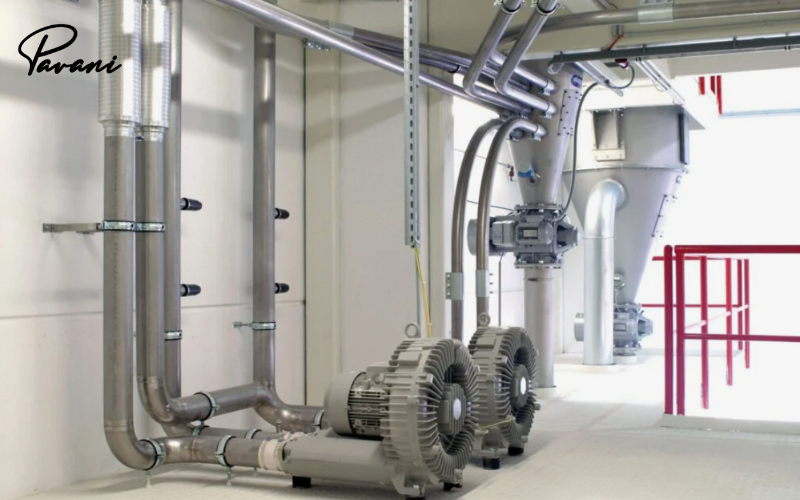Choosing Reliability: How to Select the Best Dedusting System Developer
Industrial companies such as the metal and glass industry often generate dust particles that can seriously threaten human life. Not only that, these small particulate matters also damage the equipment and decrease the efficiency of the final product. To minimize these issues, industries direct their attention to dedusting system developers. This blog will discuss industrial dust collection system design developers and what to look for when selecting a dedusting system design developer.
The importance of dedusting system and the role of dedusting system design developer
Pollutant gases are the by-product of the metal and steel industry. Two points are taken into consideration while producing the product:
- Increase efficiency
- Reducing the carbon footprint
The role of the industrial dedusting system is to keep these points in check. The system ensures that dust is being collected into the chamber. This helps in saving critical equipment. The dedusting system also ensures that no harmful gases are released into the atmosphere; hence, the environment is safe.
But there is a catch to this. Hiring a dedicated system developer who knows the ins and outs of the whole industry is important to get the maximum results. These developers consider every factor, for example, industry size, type of industry, chamber specifications, and more. Also, the developers ensure that the industrial dust collection design meets the required standards.
Industrial dust collection system design- What to consider while selecting the developer
Identifying signs of a non-experienced dedusting system developer ensures the effectiveness and reliability of the system. Common indicators include a lack of understanding of industry standards and regulations, limited knowledge of different dedusting technologies, and insufficient experience in implementing dedusting solutions for diverse industrial applications. Additionally, a non-experienced developer may struggle to provide comprehensive support and maintenance services, leading to potential operational issues and downtime. By recognizing these signs, industries can make informed decisions when selecting dedusting system developers, prioritizing expertise and track record to achieve optimal performance and compliance.
Since dedusting developers is critical for industries, it is important to consider they meet the exact requirements. This blog defines the factors to consider while selecting the right industrial dedusting systems designer.
Industry experience
Industry experience is one of those factors that is highly important in industrial dedusting system design. Different sectors have different set of requirements. A designer with experience will assess the specific requirements and provide a tailor-made solution. Look for developers who have a record of proven experience in designing and implementing dedusting systems.
Innovation and technology
The technology is continuously evolving; the same is true with dedusting systems. Every now and then, the developers develop the latest and most innovative, dedusting systems with state-of-the-art tech stacks. When looking for a developer, ensure that the developer has profound knowledge of the latest trends and tech.
Compliance and regulations
The metallurgy industry is one of those industries that is always revolving under governments’ radar. The main reason is that governments ensure that the industry’s dedusting systems meet the regulations and compliance rules. When hunting for the developer, it is important to check whether the team has required compliance certificates and is registered with regulatory authorities.
Option of customization
The metal industry is one of those industries that will always expand and come up with more upgrades. A reliable system developer should be able to meet the required needs and provide customized solutions that can cater to the expansions made in the future.
Energy consumption and efficiency
Energy consumption is a critical element in these industries. Dedusting systems should be capable enough to handle energy consumption while maintaining performance. While inquiring about the system designer, look for their energy efficiency report and see if they can install modernized tech such as ECUs, VFDs (Variable Frequency Drives), and intelligent control systems.
Maintenance and support
Lastly, an important point to consider while designing an industrial dust collection system is whether the system designer provides after-sales support and maintenance. See, the dedusting system is a combination of electrical and mechanical parts. Anything can go wrong at any time. The developer you are looking for can assist whenever needed.
What’s the Future
The future of industrial dedusting methods holds promising advancements in technology and sustainability. With a growing emphasis on environmental protection and health standards, industries increasingly invest in innovative, dedusting solutions to reduce emissions and improve air quality. These methods leverage cutting-edge technologies such as electrostatic precipitators, fabric filters, wet scrubbers, and data-driven approaches for efficient dust control. As regulations become stricter and public awareness of air pollution rises, industry-dedusting methods are expected to evolve further, driving toward cleaner and healthier environments for workers and communities.
Industrial dedusting systems are a critical part of the metallurgy industry, and if not designed accordingly, they can cause damages that will have an ever-lasting effect. Trained developers should design an industrial dust collection system design. We have compiled this guide containing factors to consider when selecting the right designer. We hope this guide will help you get the right developer.
The importance of industrial dedusting systems lies in their ability to remove harmful particulates and pollutants from industrial processes, ensuring cleaner air quality and compliance with environmental regulations (please find more details about their significance here).
Author:
Robert C. Green
The author is a metallurgy expert with a wealth of industry knowledge. With a passion for helping businesses optimize their processes and achieve excellence in metallurgical practices, they share valuable insights in their articles on metallurgy consulting.

